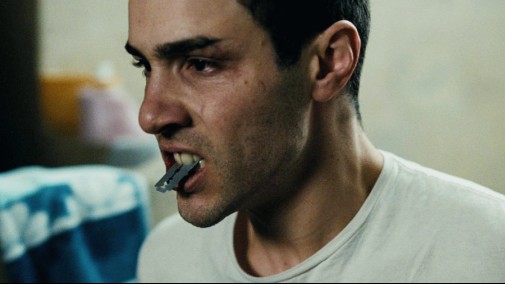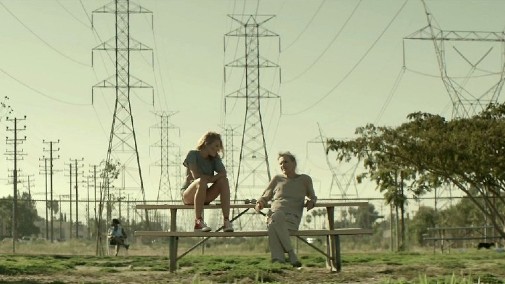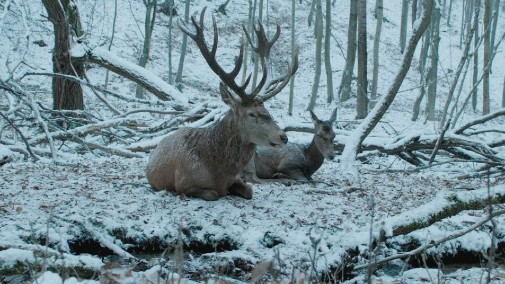Cannes at Home: Day 9
 Thursday, July 15, 2021 at 1:00AM
Thursday, July 15, 2021 at 1:00AM It was a busy day for Spike Lee's jury. Because this year's Main Competition is so extensive, with 24 films vying for the Palme d'Or, some days feature three consecutive screenings. Still, that doesn't seem to abate anyone's enthusiasm. Lee himself was seen giving a standing ovation to Sean Baker's Red Rocket, the American director's first film to compete at Cannes. Hungarian Ildikó Enyedi also premiered The Story of My Wife, while previous Palme d'Or winner Jacques Audiard presented his Paris, 13th District. To celebrate these selected cineastes, we shall recall some of their best efforts to date. Among our program, we even find a drama led by one of Lee's fellow jurors, the recently Golden Globe and BAFTA-nominated Tahar Rahim…

A PROPHET (2009)
Jacques Audiard constructs a smashing character study about a young man's corruption within the trappings of the crime genre and prison walls. Played by Rahim in his star-making turn, Malik is an Arab immigrant who finds himself behind bars and trying desperately to survive. Gradually catching other prisoners' attention, he ends up as the intermediary between two troubled factions, the Corsicans and Arabs. Moreover, the youth finds a mentor in Niels Arestrup's grizzled crime lord, César. Under his tutelage, ruthlessness is celebrated, sharpened, loyalties are tested, and identity is reshaped by necessity. Finally, through an odyssey of brutality, the student overtakes the master, and violence is thus perpetuated into the next generation. It's a vicious never-ending cycle that Audiard's camera captures with razor-sharp precision.
A Prophet is an intersection of sorts, where materiality meets the spirit world. All that, and the film also attempts an authentic depiction of life imprisoned, bruising in its patient sustaining of tension, a monotony that births out paranoia. While individual scenes may explode in shocking grisliness, blood and viscera spilled and split, the general rhythm is languid. The device confers a patina of verisimilitude to a story that is rather unimaginative in its principal beats. Nonetheless, what A Prophet lacks in innovation, it makes up for with political incisiveness. The overfamiliar arc becomes a means to explore the mutually painful compromises of assimilation. It speaks to how survival is dependent on change, even for dominant forces that must learn to abandon ossified tradition. However, it's not blind to the self-mutilation of immigrants who are forced to relinquish their cultural identities to fit in.
Available to rent from most services, including Amazon Prime Video and Youtube.

STARLET (2012)
Of the three features Sean Baker completed in the 2010s, Starlet is the least heralded title. By quite a wide margin, one might say. An unfairly wide margin, I should add. Devoid of bright colors or Oscar-nominated star turns, the film still showcases Baker's most important tenet, that of empathy. It's a value that shines through, unshakeable even in the face of amorality, social marginalization, and caustic characters that make us laugh as much as they provoke winces. From a contrived premise, Baker and co-writer Chris Bergoch unspool a nimble tale of unlikely friendship. A young rising star in the porn industry and a gambler's widow may seem like a gimmicky pairing on the surface, but Starlet more than justifies their attachment. It also complicates our understanding of them at every possible turn.
Holding together this saucy spin on the buddy comedy, Dree Hemingway and Besedka Johnson are perfect beyond words. What's remarkably delightful is how the two actresses approach their roles with strategies so different they're almost opposite. Hemingway works us through an outward projection of vacant sunniness, revealing deep wells of generosity, both for her character and her costars. As for Johnson, this one-time screen siren is all cantankerous briskness, finding tenderness in the old woman's abrasive façade, beauty in her early reticence. While the sun-bleached digital cinematography is a bit harsh and some supporting characters are painted with a broad brush, the central relationship is a treasure of incalculable value.
Streaming on Hoopla, Tubi, Kanopy, Popcornflix, Realeyz, and MUBI.

ON BODY AND SOUL (2017)
One wonders what the limits of Ildikó Enyedi's transfiguring powers are. In the film that earned her the Golden Bear of the 67th Berlinale, the Hungarian director finds love in a slaughterhouse, transforming the factory of carnage into an ethereal realm of oneiric connections. Indeed, it all starts in dreams, where mated, maybe fated, deer find company amid the snowy forest. Their human counterparts soon find one another too. From Morpheus to Eros, the mystery of shared dreamscapes gives way to intimacy, physical and beyond, a meeting of souls that's akin to pure ecstasy. Here, love shall be what breathes new life into the carcass of hopelessness, revitalizing the dead tissue until the dead heart beats once more. As the golden hues of Máté Herbai's cinematography shine on-screen, a miracle happens, and what was gone returns. On Body and Soul is a fairytale of hope resurrected.
The film is further constructed upon contrasts, the wintery dreams and toasty reality making for the most apparent duality. Something as simple as establishing the slaughterhouse's environment is full of visualized contradictions. The camera glides over bovine bodies with immense elegance, but its lens looks on eyes that glimmer with animal fear, torn apart flesh, cut sinew. It all looks beautiful as cinema, but it feels like it shouldn't. The same thing applies to the blossoming dynamic of two loners, separated by age and caught in spirals of isolation. Low self-esteem and a fear of being hurt clash with ingrained social handicaps, while connections are made between human behaviors and animal instincts. Such enterprises could be trite, but both director and actors keep the film from sinking into whimsy. As the female lead, Alexandra Borbély is especially besotting. In her hands, observing the character listen to a symphony of city sounds is an exercise in transcendence.
Streaming on Netflix.
Which of these directors is your favorite?



Reader Comments (5)
A Prophet is a major discovery I had a decade ago as it was unlike anything I had seen.
Thank you Claudio for single-handedly making this Cannes memorable!
Oh, Lazlo.... I can see that the whole praising-Claudio-in-a-way-that-explicitly-criticizes-the-other-fine-writers-on-this-site thing is alive and well. So toxic....
A Prophet and Starlet are two of the very best films I've ever seen.
I hadn't heard of Starlet, but I caught it at a festival of independent films, not expecting much. I was immediately stunned. How could such a great film be so unheralded? Every time I feared the film would lapse into cliche, it deftly avoided it, and never - never - made a wrong move. And not only are Dree Hemingway and Besedka Johnson (who sadly died soon after the film's release) perfect in every way, there are also superb turns by Stella Maeva, hilarious as Dree's greedy best friend, and James Ransome, as her sleazy boyfriend. (When he comes in to some money he buys a stripper pole for their apartment so they can film pornos there)
A Prophet is so so so good. Tahar Rahim and Neils Asterup give two of the best performances you'll ever see in a movie ever.
On Body and Soul is a film I want to see again. I don't think I was ready for its disparate elements, which seemed irritating while I watched it. But thinking about it later, I think the problem was me, not the film. I want to see if my suspicions are right.
I'm fascinated by these stories of actors who reach stardom at a certain age. The case of Besedka Johnson is similar to that of the wonderful Katie Johnson in The Ladykillers(1955).